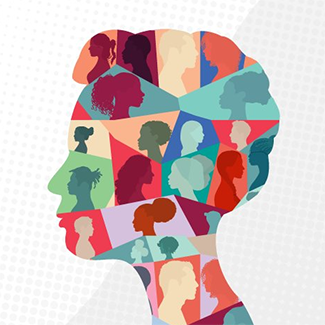
Equity, diversity, inclusion and anti-racism (EDIA-R)
We’re committed to fostering a more inclusive and equitable mental health, substance use health and addictions system.
By prioritizing anti-racism, enabling identity-affirming care and supporting reconciliation, we can help create a better future for children, young people and their families.
Why EDIA-R matters
The current child and youth mental health and addictions system doesn’t work for everyone. Many inequities and disparities make accessing quality care more difficult for certain groups, often leading to poorer overall health outcomes due to:
- Overt prejudice and discrimination.
- Implicit biases (unconsciously holding negative attitudes).
- Systemic gaps.
- Social determinants of health (the conditions and environments in which people grow, learn, live and work).
These barriers can negatively impact service offerings and care experiences. We can improve outcomes and contribute to a better quality of life for all people by working together to foster equity, diversity, inclusion and anti-racism.
Meeting children and young people where they are
Adapting programs to meet the unique needs of racialized children, young people and their families is essential. That’s where our Innovation Initiative grants come in.
-
Explore grants: Learn how our Innovation Initiative grants are supporting culturally responsive programs.
-
Meet recipients: See who is working to implement and evaluate innovative solutions in Ontario.
Advancing racial equity
Building a more equitable mental health care system requires coordinated efforts. Since 2021, we’ve worked Children’s Mental Health Ontario to lay the groundwork for our sector’s collective next steps in advancing racial equity:
Key milestones:
-
Literature review: We identified best practices to advance racial equity based on available research.
-
Sector snapshot: We surveyed our sector to get a snapshot of current racial equity efforts across the province. The “We journey together,” report also shares tools, and resources that can be leveraged to foster equity.
-
Resources for change: We produced resources focusing on collecting and using race-based data and adapting programs to better meet the needs of racialized children and young people.
Additional resources
|
Intergenerational trauma |
|
Trauma that is experienced by one generation may be transferred to subsequent generations, impacting overall health and well-being. This trauma is often transmitted through parenting and caregiving practices, family functioning and communication patterns shaped by experiences of trauma (e.g. residential school experiences, refugee experiences, physical or sexual abuse) and exposure to parents’ coping mechanisms and challenges. This tip sheet, created for Good2Talk staff, identifies protective factors that can prevent transmission of trauma from one generation to the next and presents strategies to support young people to heal. |
|
Quality standard for youth and family engagement |
|
Diversity and inclusion is a core principle in both of the engagement quality standards we co-developed with clinicians, researchers, young people and families. This principle emphasizes that high-quality engagement is representative of the communities served and that high quality engagement practices are inclusive and culturally sensitive. Two other principles in the quality standard for youth engagement —accessibility and safer spaces—also speak to an underpinning value for equity and inclusion. |
|
Raising the Bar for 2SLGBTQ+ Youth |
|
2SLBTQI+ people often experience stigma and discrimination that not only contribute to their higher risk for many mental health and substance use issues but can also make it more challenging to access services. We were one of several partners consulted as Wisdom2Action set out to create resources to help guide youth-serving organizations and their 2SLGBTQI+ inclusion efforts. |
|
How to de-identify personal information when sharing data |
|
Child and youth mental health and addictions agencies regularly collect and share client data with other care providers to communicate client needs, create safe treatment plans and inform decision making. To protect clients’ privacy, agencies need to de-identify data before sharing it. De-identification is important when sharing any kind of data, but it’s especially relevant as our sector looks to improve race-based data collection to advance equity in mental health services. This resource provides how-to guidance to help agencies share data in a way that is compliant with privacy legislation and ensures anonymity and confidentiality. |
Peer-reviewed publications
|
Canadian Journal of Community Mental Health, May 2023 |
|
Article title: Organizational Practices Advancing Racial Equity (OPARE): Development of a Tool Using an Implementation Science Approach Abstract: Organizational practices to advance racial equity are needed to address the systemic nature of racism. Implementation science frameworks offer a comprehensive approach when implementing complex initiatives. We describe the development of a tool to assess organizational practices in advancing racial equity (OPARE). Findings on the acceptability, reliability and preliminary validity are presented based on 98 responses from child and youth mental health agencies across Ontario. The OPARE shows promise as a valid and reliable organizational assessment tool for helping plan, implement and evaluate racial equity efforts in community mental health settings. |
|
Canadian Psychology, July 2022 |
|
Article title: Advancing racial equity, diversity and inclusion in Ontario’s child and youth mental health sector: Perspectives of agency leaders. Abstract: Systematic challenges in providing culturally responsive mental health and addictions services have produced widespread inequities for racialized service providers, clients, and communities. There is a pressing need for coordinated system-level change. In this article, we present findings from a cross-sectional mixed methods study examining current organizational practices in advancing racial equity in the child and youth mental health and addictions sector in Ontario. To understand current efforts and identify a path forward, we surveyed executive leaders from 102 agencies and conducted case studies with 10 agencies on their practices along five domains: organizational leadership, intersectoral partnerships, workforce diversity and development, client and community engagement, and continuous improvements. Leaders shared a strong desire to advance racial equity and had begun this work to varying degrees. Our findings, in particular the domains examined and barriers and facilitators, can inform parallel efforts in related sectors across Canada and internationally. |
|
Administration and Policy in Mental Health and Mental Health Services, July 2021 |
|
Article title: Moving toward racial equity in the child and youth mental health sector in Ontario, Canada Abstract: In the aftermath of high-profile incidents involving Black, Indigenous and People of Color (BIPOC) in North America, there is a growing awareness of the pervasiveness of systemic racism and the role that agencies play in perpetuating racism and racial inequities. In the child and youth mental health sector, the journey to improving racial equity is impeded by a lack of consistent frameworks or guidelines. In this commentary, we explore five domains of organizational practices that are prominent in the literature and support diverse clients, communities and staff, including: (1) organizational leadership and commitment, (2) inter-organizational and multisectoral partnerships, (3) workforce diversity and development, (4) client and community needs and engagement and (5) continuous improvement. As we highlight these domains, we urge researchers, policy makers, and child and youth mental health service providers to work together to advance racial equity in meaningful ways. |









